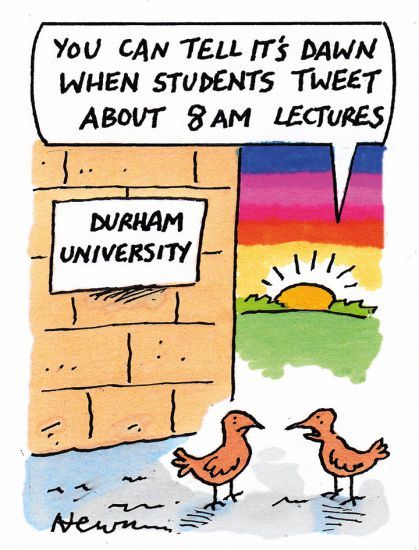
New polling has found that there is no evidence that UK students are more hostile to free speech than the general population. The YouGov free speech survey, published on 27 June, asked students and the general public about a series of hypothetical controversial speakers, finding that there was “no essential difference” between the two groups when it came to the proportions of those who thought the speech in question should not be allowed. Unsurprisingly, this take on the campus free speech debate did not stop The Daily Telegraph reaching its own conclusions. It introduced its 28 June report on the study with the headline: “‘Snowflake’ generation of students’ hostility to free speech revealed”, adding that “the majority want controversial speakers to be ‘no platformed’”. Although YouGov had said that “the results do not find any evidence that students are more hostile to free speech than the general population”, the Telegraph made no mention of this. Curiously, Sam Gyimah, the universities minister, who is normally an ardent commentator on campus free speech, had nothing to say about the YouGov survey.
Mr Gyimah relaunched his idea for a “MoneySuperMarket for students”, but the reception remained much the same. His tweet on 26 June to launch a competition to entice tech companies to create a comparison tool for university applicants received a torrent of unflattering comments from university staff, who pointed out holes in the policy first announced in March. “Oh cool you’ve managed to distill everything that’s wrong with HE in the UK into one policy, nice!” tweeted one fan, while another wondered how the self-styled “minister for students” had concluded that “more league tables and marketisation is the correct idea”. As a fan of metrics, Mr Gyimah will no doubt have noticed that his tweet attracted four times as many comments as likes – usually a sign that a tweet has not been well received.
Durham University’s decision to end students’ “long lie-ins” by starting some lectures at 8am was sufficiently shocking for The Times to place the story on its front page. “It feels like this is a stab in the dark,” said Celine Delal Kart, a first-year law student, who complained that it would be “difficult to sustain an effective work mode when fatigued”. The move, reported on 26 June, seemed to attract different reactions from Times readers, with Rob Naylor from Cheltenham suggesting that “those uncomfortable with these ‘exhausting’ start times…should try fruit picking”. Another reader, Mark Burgess from London, recalled, however, how he had “overslept for a tutorial with Professor John Batchelor of New College Oxford” that began at 5pm.
European Union students enrolling at English universities in 2019-20 will pay the same tuition fees as home students for the duration of their degrees, the government announced in a long-awaited Brexit pledge on 2 July. EU students will also remain eligible for financial support throughout their degrees, said the Department for Education – a mere five months after Scotland had made a similar pledge to EU applicants. “Today’s announcement could not have come a moment too soon,” said Tim Bradshaw, chief executive of the Russell Group, whose 24 universities receive more than 100,000 applications from EU students each year. “Applications open in a just a few months, and many prospective students are already attending open days and making their decisions,” added Mr Bradshaw.
UK university staff are to be balloted on whether to strike over pay, just months after walkouts in a dispute over pensions. In an initial consultation, 82 per cent of participating members of the University and College Union voted to reject the offer from the Universities and Colleges Employers Association of a minimum pay rise for 2018-19 of 2 per cent, rising to 2.8 per cent for the lowest paid. In the consultation, which had a 47.7 per cent turnout, 65 per cent of respondents indicated that they were prepared to take industrial action over the issue. UCU members will now vote in a formal ballot, which will open in August and close in October. The union said that pay for those in sector-wide agreements has declined in real terms by 21 per cent since 2010.
Register to continue
Why register?
- Registration is free and only takes a moment
- Once registered, you can read 3 articles a month
- Sign up for our newsletter
Subscribe
Or subscribe for unlimited access to:
- Unlimited access to news, views, insights & reviews
- Digital editions
- Digital access to THE’s university and college rankings analysis
Already registered or a current subscriber? Login






